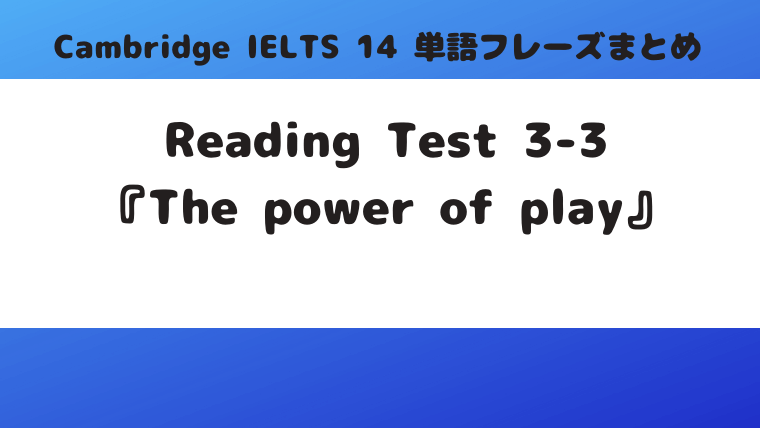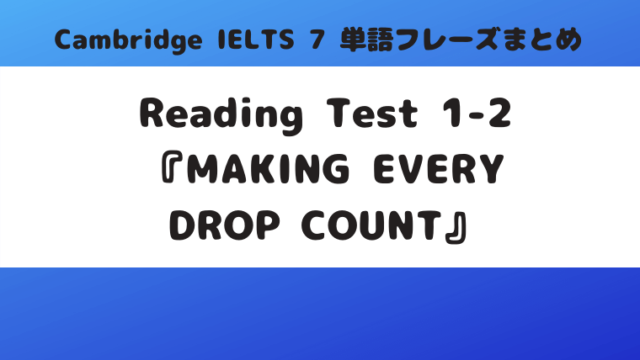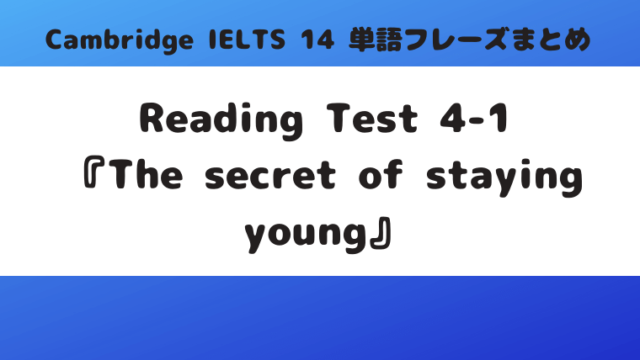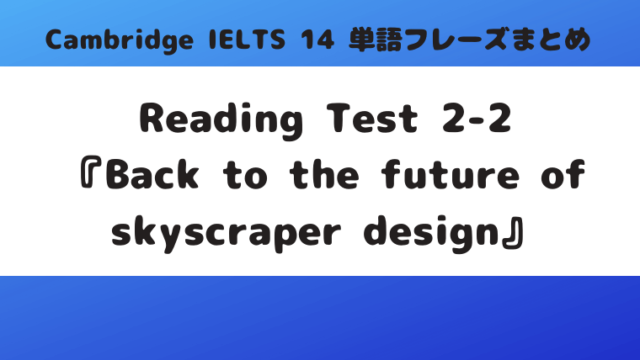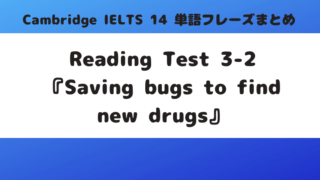「Cambridge IELTS 14」Reading Test3-3『The power of play』の単語・フレーズをまとめました。
私がIELTS Readingの単語・まとめを行う理由は「Cambridge IELTS Reading単語・フレーズまとめ」からご覧ください。
Reading Test 3 Passage 3:The power of play
- intense
adjective /ɪnˈtens/
・extreme and forceful or (of a feeling) very strong:
・Intense people are very serious, and usually have strong emotions or opinions
1 <感情・味・においなどが> 激しい, 強烈な, <色が> 非常に濃い
2 <競争・議論などが> 激しい, 猛烈な, 熾烈(しれつ) な
3 厳格な, きまじめな
4 <映画・会話などが> 深刻な, 重々しい - component
noun /kəmˈpəʊ.nənt/
a part that combines with other parts to form something bigger:
構成要素, (機械類の) 部品, パーツ, (薬品などの) 成分 - counterpart
noun /ˈkaʊn.tə.pɑːt/
・a person or thing that has the same purpose as another one in a different place or organization:
somebody’s / something’s counterpart
<…>の対応相手[対応物] - under pressure of
~に追われて、~に迫られて、~にせかされて - kindergarten
noun /ˈkɪn.dəˌɡɑː.tən/
・us the first year of school, for children aged five
・uk a nursery school
幼稚園 ((米国では5,6歳児,英国では3,4歳児が通う)) - preschooler
noun /ˈpriːˌskuː.lər/
a child who is not old enough to go to formal school
1 就学前の児童
2 幼稚[保育]園児 - leg up
〔スポーツ選手などが〕試合日にあわせて体調を整える
〔人が〕馬に乗るのを手伝う - flash card
noun /ˈflæʃ ˌkɑːd/
a card with a word or picture on it that is used to help students learn
フラッシュカード ((言葉・絵・数字などを書いた教材用のカード)) - dichotomy
noun /daɪˈkɒt.ə.mi/
a difference between two completely opposite ideas or things:
二分される違い, 二項対立 - lay
verb /leɪ/
・to put something in especially a flat or horizontal position, usually carefully or for a particular purpose:
・to prepare a plan or a method of doing something:
・(of an animal or bird) to produce eggs from out of the body:
・slang to have sex with someone:
・to risk something, usually money, on the result of an event:
・to express a claim, legal statement, etc. in a serious or official way:
1 《T always + adverb/preposition》 …を置く, 横たえる
2 a) 《他》 <鳥・昆虫などが> <卵> を産む
b) 《自》 卵を産む
3 《他》 <土台など> を据える, <管・鉄道など> を設置する
4 《自》 〘非標準〙 (lie の代用として) 横たわる, 横になる ((ふつう誤用とされる))
5 《他》 <金> を賭(か) ける
6 《他》 lay the foundation / groundwork / base for something
<…>の基礎を築く, 下準備をする
7 《他》 lay a charge / an accusation (against somebody)
(犯罪・悪行などについて) (<人>を)告発する, 非難する
8 英 《他》 lay the table
食卓を準備する
同意 set 米
9 《他》 lay a fire
火をおこす - repertoire
noun /ˈrep.ə.twɑːr/
all the music or plays, etc. that you can do or perform or that you know:
1 レパートリー, 上演目録, 演奏曲目
2 (得意分野としての) レパートリー, 持ちごま - consensus
noun /kənˈsen.səs/
a generally accepted opinion or decision among a group of people:
合意, 意見の一致, コンセンサス - elude
verb /iˈluːd/
・formal If something that you want eludes you, you do not succeed in achieving it:
・to not be caught by someone:
・formal If a piece of information eludes you, you cannot remember it:
1 <追及など> を逃れる, 避ける
同意 avoid
2 〘書き言葉〙 <望みのものなどが> <人> の手に入らない
3 <言葉・答えなどが> <人> に思い浮かばない, 思い出せない - discrete
adjective /dɪˈskriːt/
clearly separate or different in shape or form
分離した, 別々の - purposeless
adjective /ˈpɜː.pəs.ləs/
done without a clear intention
(明確な) 目的のない, 意味のない 同意 pointless 反意 purposeful - freely
adverb /ˈfriː.li/
・without being controlled or limited:
・in a way that is not fixed or joined to anything, so able to move easily
1 (制約などがなく) 自由に, じゃまされずに
2 (動きなどについて) 自由に, スムーズに
3 包み隠さず, 正直に
4 進んで, 気前よく
5 (翻訳について) 意訳で - arise
verb /əˈraɪz/
・formal to happen:
・literary to get out of bed:
1 生じる, 起こる
2 〘文〙 起床する
3 〘文〙 立ち上がる
4 〘文〙 蜂起(ほうき) する, 決起する - continuum
noun /kənˈtɪn.ju.əm/
something that changes in character gradually or in very slight stages without any clear dividing points:
連続体 - intrinsically
adverb /ɪnˈtrɪn.zɪ.kəl.i/
in a way that is an extremely important and basic characteristic of a person or thing:
本質的に, 本来 - engage
verb /ɪnˈɡeɪdʒ/
・mainly uk formal to employ someone:
・formal to interest someone in something and keep them thinking about it:
・formal to become involved, or have contact, with someone or something:
・to make one part of a machine fit into and move together with another part of a machine:
・military specialized to attack or begin to fight someone:
・indian english to teach someone, especially a class of children, or to keep someone busy
en‧gage S3 W2 J3 /ɪnˈgeɪdʒ/ [動]
1 《他》 〘フォーマル〙 <人> を魅了する
2 《他》 〘フォーマル〙 <人> を雇う, 採用する
3 a) 《他》 <敵軍> と交戦する
b) 《自》 交戦する
4 a) 《他》 <ギア・クラッチなど> を入れる
b) 《自》 <歯車などが> かみ合う, 連動する
反意 disengage - extrinsically
無関係な状態で、非本質的に、外来的に、付帯的に - spontaneous
adjective /spɒnˈteɪ.ni.əs/
・happening or done in a natural, often sudden way, without any planning or without being forced:
・biology, medical specialized happening, especially in a living thing, without being caused by something outside, or without the organism’s control:
1 <ふるまい・行動などが> 自発的な, 自然(発生的)な
2 〘ほめて〙 行動の早い
3 〘専門〙 <生物学的・化学的な過程が> 自然(発生的)な, 自発性の - thus
adverb /ðʌs/
・in this way:
・with this result:
1 《文修飾》 したがって, それゆえ
同意 therefore, hence
2 (thusly とも 〘やや古〙 ) このように(して), こうすることで - blend
noun /blend/
・a mixture of different things or styles:
・a word formed by combining two other words:
1 a) 《他》 <複数のもの・液体など> を混ぜる, 混ぜ合わせる
b) 《自》 混ざる, 混ざり合う
2 a) 《他》 blend something and something
b) 《自》 調和する, 溶け合う blend with something
3 《他通例受け身形で》 <紅茶・たばこなど> をブレンドする, 調合する - detrimental
adjective /ˌdet.rɪˈmen.təl/
causing harm or damage:
有害な, 不利益な - robust
adjective /rəʊˈbʌst/
(of a person or animal) strong and healthy, or (of an object or system) strong and unlikely to break or fail:
1 頑健な, しっかりした, 丈夫な
2 <制度・組織などが> しっかりした, 健全な, 堅調な
3 <物が> 頑丈な
4 こくのある, 味わいの深い, 芳醇(ほうじゅん) な
5 <言動が> 断固[決然]とした - somewhat
adverb /ˈsʌm.wɒt/
to some degree
いくらか, 若干 - avenue
noun /ˈæv.ə.njuː/
・a wide road with trees or tall buildings on both sides, or a wide country path or road with trees on both sides:
・uk a road that leads to a large house
・a method or way of doing something:
1 大通り, 街路
2 英 並木道
3 (達成するための) 手段, 道
explore every avenue

